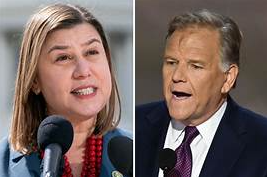Republican Mike Rogers questioned whether Democrat Elissa Slotkin, a former CIA analyst, could pass a polygraph. Slotkin attacked Rogers as a “fist-pumper” for the Iraq War.
In a heated exchange during their first Senate debate, Democratic Rep. Elissa Slotkin and former Republican Rep. Mike Rogers sparred over issues of national security, foreign policy, and bipartisanship. The debate, held in Grand Rapids, Michigan, on Tuesday, showcased the stark contrasts between the two candidates as they vie for the Senate seat vacated by longtime Democratic Sen. Debbie Stabenow.
Rogers, known for his background in intelligence, questioned Slotkin’s credibility, especially regarding her time as a CIA analyst. He suggested that she might not even pass a polygraph test about her work with the agency. Slotkin, in turn, rebuked Rogers, accusing him of “huffing at the microphone” during a tense exchange about U.S.-China relations and challenged his ability to work collaboratively on national security issues.
The debate also highlighted the candidates’ efforts to appeal to Michigan’s swing-state voters by emphasizing their bipartisan credentials. Slotkin proudly noted that she had been recognized as one of the most bipartisan members of Congress, while Rogers, who had served as the chairman of the House Intelligence Committee, claimed he would continue to look for opportunities to work across the aisle.
Foreign policy and national security were the most contentious topics, with Slotkin attacking Rogers for his strong support of the Iraq War. She criticized him as a “fist-pumper” in the lead-up to the conflict, a reference to his vocal backing of the invasion. Rogers, in turn, questioned Slotkin’s integrity, accusing her of using CIA deception tactics against voters rather than adversaries.
Another point of disagreement arose when the two discussed economic issues, particularly proposals for down payment assistance for first-time homebuyers. Slotkin, when asked about Vice President Kamala Harris’ plan to offer $25,000 in assistance, deferred on her position, citing the need for more details on the program before offering support.
As the debate ended, both candidates had painted themselves as strong, bipartisan figures in Michigan politics, yet their differences on foreign policy, national security, and economics underscored the tension between them in what is expected to be a closely watched race.

